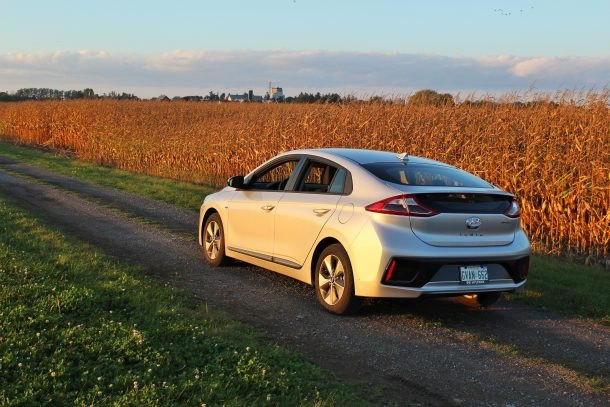One of the Market's Least Expensive EVs Is Due for a Range Bump

Happen across a Hyundai Ioniq in your daily travels, and it’ll almost inevitably be a hybrid or plug-in hybrid model, not the fully electric variant. That’s because, unless you live in California, the Ioniq Electric is off limits. For now.
With a range that might have once impressed and an entry price starting below $30,000 before government incentives, the Ioniq Electric is an affordable five-door for those who aren’t concerned about brand snobbery or lengthy road trips. Still, Hyundai knows that models that don’t compete, don’t sell. That’s why the little hatch will soon be able to go further on a tank of charged particles.
Speaking to Inside EVs, Gil Castillo, Hyundai’s senior group manager for alternative vehicle strategy, said the Ioniq Electric’s 124-mile range will see a boost in about a year.
“The Ioniq’s range will improve at the model-year change. It will get bigger,” Castillo said, likely referring to a 2020 model offered late next year. While the automaker’s website shows only the 2018 model on sale right now, EPA tests on the 2019 model show no difference in fuel economy equivalency. So, how much further can owners expect to drive?
“It will be a nice improvement, but not like the Kona’s range,” Castillo said, referring to the Kona Electric’s 258-mile capability.
Not long ago, cresting the 100-mile market in a non-Tesla EV was something of a feat. Nissan’s Leaf and Ford’s Focus Electric started below 80 miles of range, eventually increasing their stomping grounds past the triple-digit bar. Until 2018, the Leaf was good for 107 miles. Now, the second-generation model offers 151 miles of range starting at $30,875 after a destination charge, but before a $7,500 EV tax credit. The Ioniq Electric’s price, which includes destination, starts at $29,500 before a tax credit.
For many, an extra 27 miles is worth paying the additional $1,375 to get into a Leaf. Of course, that’s assuming you live in California. Elsewhere, the Leaf offers a happy medium of range and price for buyers of modest means, with a pricier 200-plus-mile variant on the way for 2019.
While a range of around 200 miles would give the Ioniq Electric a serious leg up, you’d have to be pretty confident in Hyundai’s battery prowess to keep that dream alive. More likely, Hyundai will seek to outrange the base Leaf with its upgraded model, even if it’s by a mile or two.
[Image: Steph Willems/TTAC]

More by Steph Willems
Latest Car Reviews
Read moreLatest Product Reviews
Read moreRecent Comments
- 3-On-The-Tree Lou_BCone of many cars I sold when I got commissioned into the army. 1964 Dodge D100 with slant six and 3 on the tree, 1973 Plymouth Duster with slant six, 1974 dodge dart custom with a 318. 1990 Bronco 5.0 which was our snowboard rig for Wa state and Whistler/Blackcomb BC. Now :my trail rigs are a 1985 Toyota FJ60 Land cruiser and 86 Suzuki Samurai.
- RHD They are going to crash and burn like Country Garden and Evergrande (the Chinese property behemoths) if they don't fix their problems post-haste.
- Golden2husky The biggest hurdle for us would be the lack of a good charging network for road tripping as we are at the point in our lives that we will be traveling quite a bit. I'd rather pay more for longer range so the cheaper models would probably not make the cut. Improve the charging infrastructure and I'm certainly going to give one a try. This is more important that a lowish entry price IMHO.
- Add Lightness I have nothing against paying more to get quality (think Toyota vs Chryco) but hate all the silly, non-mandated 'stuff' that automakers load onto cars based on what non-gearhead focus groups tell them they need to have in a car. I blame focus groups for automatic everything and double drivetrains (AWD) that really never gets used 98% of the time. The other 2% of the time, one goes looking for a place to need it to rationanalize the purchase.
- Ger65691276 I would never buy an electric car never in my lifetime I will gas is my way of going electric is not green email


































Comments
Join the conversation
Doesn't need to have the range of the Kona EV as it's a good thing for an automaker to offer BEVs at different price-points (not everyone needs 290+ m of range).
Why is it thought that a battery with the capacity of those used in these vehicles should be able to recharge in 5 minutes? (serious question) The AA/AAA rechargeables I use - much, much lower capacity in comparison - take more than an hour to charge especially if charging from nearly depleted. I just don't get the criticism.